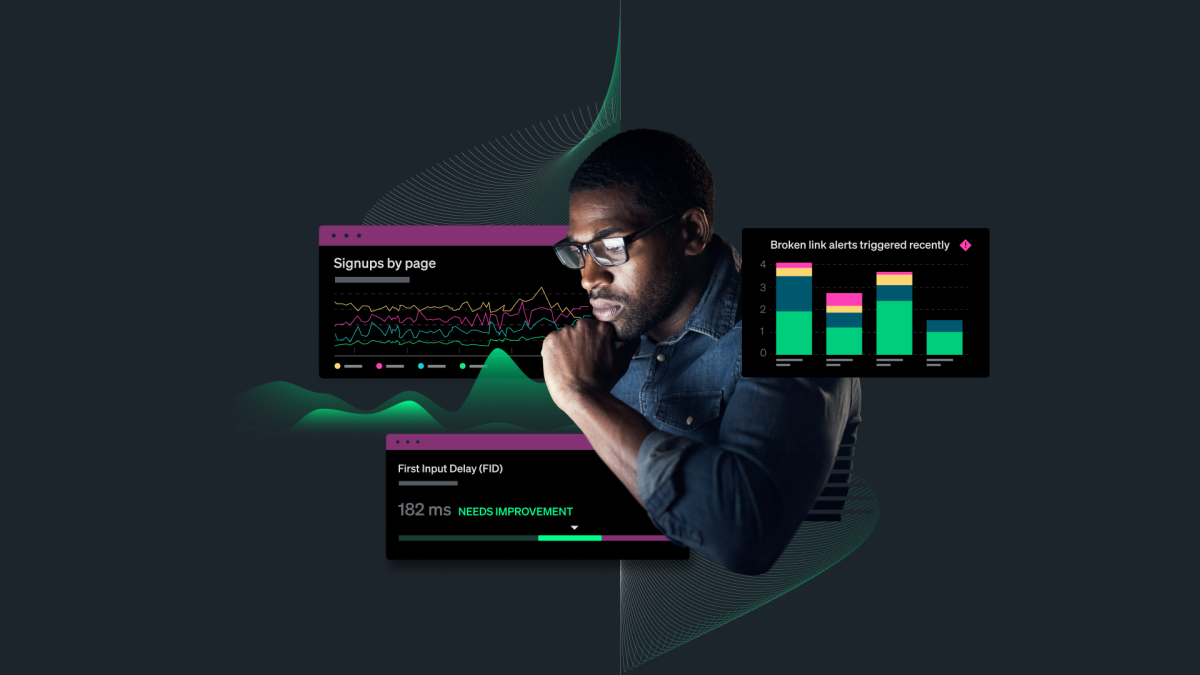
Discover how business leaders can harness the power of marketing observability tools like New Relic to enhance website performance, track campaigns, and ensure backend health for optimal business growth.
Key Takeaways:
- New Relic offers marketing leaders increased visibility, early issue detection, proactive troubleshooting, and improved decision-making.
- Marketers can easily monitor website performance, track conversions, campaigns, and launches, and ensure backend health with New Relic's comprehensive platform.
As a marketer, data is one of the most crucial keys to growing the business. Software engineers are known for working with vast amounts of telemetry data to monitor, troubleshoot, and improve the performance of their applications and systems. But what if I told you that the powerful observability tools they use can also be a marketer’s secret weapon?
In this blog post, you'll see how marketing leaders can use the New Relic observability platform to improve their website performance, track marketing campaigns, and monitor the health of their backend.
What is observability marketing?
Observability marketing involves leveraging data and analytics to gain insights into customer behavior, preferences, and interactions with a brand or product. The term "observability" originates from the field of engineering and refers to the ability to understand the internal state of a system based on its external outputs. In the context of marketing, observability involves monitoring and analyzing various touchpoints and channels through which customers engage with a brand, such as website visits, social media interactions, email responses, and purchases.
Observability marketing relies heavily on technologies like data analytics, machine learning, and artificial intelligence to collect, process, and interpret large volumes of data generated by customer interactions. Understanding customer behavior and preferences more deeply helps companies tailor their marketing strategies, messages, and offerings better to meet the needs and desires of their target audience.
Key components of observability marketing include:
- Data collection: Gathering data from various sources such as websites, social media platforms, customer relationship management (CRM) systems, and transaction records.
- Data analysis: Analyzing the collected data to identify patterns, trends, and insights related to customer behavior, preferences, and engagement with marketing initiatives.
- Customer segmentation: Segmenting customers based on demographic information, behavior, preferences, or other relevant factors to personalize marketing efforts and target specific audience segments more effectively.
- Predictive analytics: Using predictive modeling and machine learning algorithms to forecast future customer behavior and trends, allowing marketers to anticipate needs and proactively address them.
- Real-time monitoring: Monitoring customer interactions and marketing performance in real-time to quickly identify opportunities or issues and make timely adjustments to marketing campaigns.
- Performance optimization: Continuously optimizing marketing strategies, messages, and channels based on data-driven insights to improve overall effectiveness and ROI.
How observability marketing benefits businesses
Observability marketing enables marketers and business leaders to move beyond traditional methods and adopt a more agile and data-driven approach to understanding and engaging with customers. Leveraging the power of data and analytics helps companies enhance customer experiences, drive customer loyalty, and ultimately achieve their marketing objectives more effectively.
Some of the most significant observability marketing benefits include:
- Better understanding of customer behavior: Observability marketing allows businesses to gain deeper insights into customer behavior, preferences, and interactions with their brand.
- Enhanced personalization: Audience segmentation enables marketers to deliver more personalized and targeted messages, offers, and experiences to different customer groups, increasing the relevance and effectiveness of their marketing efforts.
- Improved marketing ROI: Leveraging data-driven insights and analytics helps businesses optimize their marketing strategies, messages, and channels for better performance. This optimization can increase ROI by maximizing the impact of marketing investments and minimizing losses from ineffective tactics.
- Proactive decision-making: Real-time monitoring and predictive analytics capabilities inherent in observability marketing enable businesses to identify trends, opportunities, and potential issues early on. This allows marketers to make proactive decisions and adjust their marketing campaigns, ensuring agility and responsiveness in a rapidly changing marketplace.
- Enhanced customer experience: Tailoring marketing efforts to deliver more relevant and engaging experiences to customers leads to improved satisfaction and loyalty, as customers feel understood and valued by the brand.
- Competitive advantage: Businesses that embrace observability marketing gain a competitive edge by staying ahead of market trends and customer preferences. These businesses can outperform competitors and maintain a stronger position in the marketplace.
Benefits of using New Relic for marketing and business leaders include:
- Increased visibility: New Relic provides a single pane of glass for monitoring your entire IT infrastructure, giving you a comprehensive view of your performance and health.
- Early detection: New Relic alerts and notifications can help you detect performance issues early, before they impact your users.
- Proactive troubleshooting: New Relic data can help you identify the root cause of performance issues so that you can fix them quickly and easily.
- Improved decision-making: Utilize the data from all your systems, applications, and websites to make better decisions about allocating your resources and improving your business performance.
In this video, Andy shows you how you can connect business and software performance data in New Relic to make high-impact decisions about your website, marketing campaigns, and more.
Easily understand and improve site performance
Speedy sites attract more users and revenue. The New Relic website performance monitoring tool allows you to track the performance of your (or anyone else’s) website without manual setup. By simply entering a URL, you get a dashboard to continuously monitor key performance metrics that search engines care about, such as Google Core Web Vitals. This data can be used to identify and fix performance issues, improve the user experience, and benchmark with other web pages.
Built-in capabilities include:
- Historical and ongoing reporting, unlike other one-off manual site checkers.
- Automated alerts for page down and broken links.
- Scheduled website checks, as often as you need.
- Recommendations for best practices and how to troubleshoot issues.
Try New Relic website performance monitoring for free.
Keep your website fast and error-free so you can improve your customer experience and conversion rates. Sign up now, with no credit card required, for 500 free site checks per month.
Benchmark and compare the performance of different web pages with custom dashboards in New Relic.
Dive deeper into browser performance metrics with New Relic browser monitoring.
Track conversions, campaigns, and launches
Ensure the health of your business by analyzing the trends in conversion sources, rates, and types.
This is where understanding the nuances of business application monitoring becomes invaluable. With tools designed for this purpose, you can dive deeper into how your business applications are performing, impacting your marketing strategies and overall business health. Logs unlock a deeper level of analysis, allowing you to track the performance of your marketing campaigns. With this data, you can get a near-real-time view of every user interaction on your website. That means you’ll be able to answer questions like:
- Which campaigns are driving results?
- Which sources and mediums are working best?
- Who are my top referrals and lead sources?
Use New Relic to help you understand your campaign performance.
As a result, you make better decisions on where to spend your marketing dollars.
More importantly, unlike with other tools, you no longer have to wait hours or even days to find out that something is broken. You can proactively steer your business in the right direction.
Analyze individual page performance to understand the impact of a launch or piece of content.
Monitor backend health
The health and performance of your servers and hosts are critical for a great customer experience. New Relic provides visibility into the backend by tracking metrics such as throughput, web transactions, and errors. This data can be used to identify and fix performance issues, prevent bot attacks, and ensure that your website is always up and running.
See how New Relic provides a full view of your system’s backend in a single place in the video below.
Conclusion
New Relic is a powerful observability platform that can drive business decisions. With the New Relic suite of tools, you can easily track the performance of your website and marketing campaigns, identify and troubleshoot performance issues, and make better decisions about how to allocate your resources.
If you’re a business executive, I encourage you to check out New Relic so you can leverage data to improve uptime, drive quality customer experience, and maintain the health of your business.
Sign up free here to get started with New Relic website performance monitoring.
本ブログに掲載されている見解は著者に所属するものであり、必ずしも New Relic 株式会社の公式見解であるわけではありません。また、本ブログには、外部サイトにアクセスするリンクが含まれる場合があります。それらリンク先の内容について、New Relic がいかなる保証も提供することはありません。




